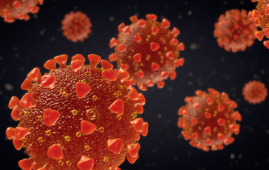

The effects of the COVID vaccine from Pfizer and AstraZeneca on the immune system are fundamentally different, according to a recent Australian study performed by SAHMRI and Flinders University.
In the COVID-19 Vaccine Immune Responses Study (COVIRS), which was reported in Cell Reports Medicine, 102 adults of various ages lived in South Australia—where there was not a widespread SARS-CoV-2 transmission—had their immune systems monitored.
Immediately following each dosage of either the Oxford/AstraZeneca or Pfizer/BioNTech COVID-19 vaccine, participants had their blood drawn to measure the early immune response.
In order to assess B and T cell activity, they were also examined 28 days following each vaccination. Both are essential because T cells kill infectious cells and B cells create antibodies.
The vaccines differ in how they accomplish this, but they are similar in that they encourage the immune system to recognize and defend against the SARS-CoV-2 virus.
The AstraZeneca vaccine employs a benign virus (a chimpanzee adenovirus) to encode the Spike protein. However, the Pfizer vaccination uses mRNA technology to encourage host cells to create the SARS-CoV-2 Spike protein.
David Lynn, director of SAHMRI’s Systems Immunology Laboratory and professor at Flinders University, oversaw the study, which examined immune responses in thousands of blood samples using a technique known as “multi-omics,” a type of biological analysis.
Professor Lynn says this comprehensive analysis of immune responses to these different vaccines has revealed lots of new information that’ll help inform future vaccine design.
“After the first dose, we were surprised to find the Oxford/AstraZeneca vaccine elicits an unexpected memory-like response in the immune system, recognizing the vaccine as if it’s something it’s seen before,” says Professor Lynn, from the College of Medicine and Public Health at Flinders University.
“This response is targeted against the adenovirus vector in the vaccine, not the Spike protein and the intensity of this response correlates with the expression of proteins that act as a pre-cursor to thrombosis, or blood clotting.
“While Vaccine-induced immune thrombotic thrombocytopenia (VITT) is an extremely rare side effect associated with the Oxford/AstraZeneca vaccine that none of the participants developed during the study, this research offers a potential explanation for the connection between the Oxford/AstraZeneca vaccine and the cases of VITT that’s been reported.”
The study also discovered that, compared to those who had two doses of the Pfizer/BioNTech vaccination, those who had only received two doses of the Oxford/AstraZeneca vaccine often produced lesser quantities of antibodies and less of a specific type of T-cell that aids in antibody formation.
Nevertheless, after they received their third booster dose of an mRNA vaccine, this was resolved, highlighting the value of booster doses.
The results strengthened the argument that certain persons benefit more from COVID-19 vaccination protection than others.
Professor Lynn says age is a factor, with older persons often having a lesser immunological response after two doses. The reasons for this variability are unclear. Fortunately, this was successfully overcome by a third booster dose.
Immune responses induced immediately after vaccination predicted the subsequent B and T cell response to the vaccine measured a month later.
“One to two days after initial vaccination we measured gene expression responses in the blood which correlated with adaptive immune responses that mediate protection 28 days later,” Professor Lynn says.
A further surprise to researchers was the finding that feeling unwell after a vaccine dose may in fact be linked to its effectiveness.
“People who showed symptoms of fatigue and fever immediately after the third dose were more likely to have better T-cell responses. T-cells play a vital role in vaccine efficacy as they can directly kill viral cells,” Professor Lynn said.
The Murdoch Children’s Research Institute, SAHMRI, Flinders University, University of Melbourne, University of Adelaide, Basil Hetzel Institute for Translational Health Research, University of New South Wales, The Kirby Institute, Alfred Hospital, Monash University, AstraZeneca, and the Royal Adelaide Hospital all participated in the study as major collaborators.
Overall, this investigation has given us valuable new insights into the early immunological reactions to these vaccinations and has helped us better understand how these vaccines function to provide protection against COVID-19.
more recommended stories
 Study Reveals Cold May Impact SARS-CoV-2 Infection Rates
Study Reveals Cold May Impact SARS-CoV-2 Infection RatesThe Unexpected Protective Role of Rhinoviruses.
 Heart, Lung, & Brain Risks Persist in COVID-19 Survivors
Heart, Lung, & Brain Risks Persist in COVID-19 SurvivorsA French nationwide study reveals that.
 How COVID-19 and Vaccines Differ in Heart Inflammation
How COVID-19 and Vaccines Differ in Heart InflammationA team of international researchers led.
 Long COVID: Extended Paxlovid Treatment Offers Hope
Long COVID: Extended Paxlovid Treatment Offers HopeA new case series by UC.
 RSV Vaccine Response in Immunocompromised Adults
RSV Vaccine Response in Immunocompromised AdultsAccording to Johns Hopkins Medicine researchers,.
 Gut Microbiome Predicts Long COVID Risk
Gut Microbiome Predicts Long COVID RiskIn a recent pre-print study published.
 COVID-19 & Autoimmune Care Hope: Natural Proteins
COVID-19 & Autoimmune Care Hope: Natural ProteinsRecent research at Umeå University reveals.
 FasL Inhibitor Asunercept Speeds COVID-19 Recovery
FasL Inhibitor Asunercept Speeds COVID-19 RecoveryA new clinical trial demonstrates that.
 Impact of COVID-19 mRNA Vaccine on Myocardial Scarring
Impact of COVID-19 mRNA Vaccine on Myocardial ScarringA new study found a greater.
 Long-term Cognitive and Psychiatric Issues in COVID-19 Survivors
Long-term Cognitive and Psychiatric Issues in COVID-19 SurvivorsA new study published in The.

Leave a Comment